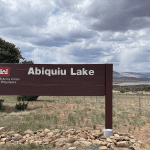- Seven states face a May deadline to reach a water-sharing agreement.
- Legal disputes over the 1922 Compact threaten to derail negotiations.
- Reservoirs remain dangerously low as climate impacts deepen.
Wednesday, April 2, 2025 — As the May deadline looms, the seven states that rely on the Colorado River are under mounting pressure to finalize a unified plan for managing the shrinking water supply. The current operating guidelines will expire in 2026, and if the states cannot reach a consensus, the federal government is expected to impose its own plan—one that could result in steep water cuts, particularly for Arizona, California, and Nevada. Negotiations have been stalled by deep divides between the Upper Basin states, which use less water and argue for future growth, and the Lower Basin states, which have long utilized their full share. Meanwhile, tribal nations and environmental organizations are advocating for a seat at the table to ensure their needs are considered.
by deep divides between the Upper Basin states, which use less water and argue for future growth, and the Lower Basin states, which have long utilized their full share. Meanwhile, tribal nations and environmental organizations are advocating for a seat at the table to ensure their needs are considered.
Disagreements Over the 1922 Compact.
Central to the impasse is the interpretation of the 1922 Colorado River Compact , which originally divided the river’s flows between the Upper and Lower Basins. The Lower Basin states argue that the Upper Basin must deliver 75 million acre-feet of water over any 10-year period—plus half of the U.S. obligation to Mexico—while Upper Basin states maintain they are only obligated not to cause a shortfall. This long-standing legal gray area is becoming increasingly urgent as climate change accelerates the river’s decline. A potential “compact call”—a legal move to force compliance—could spark a protracted courtroom battle and throw water deliveries into uncertainty.
, which originally divided the river’s flows between the Upper and Lower Basins. The Lower Basin states argue that the Upper Basin must deliver 75 million acre-feet of water over any 10-year period—plus half of the U.S. obligation to Mexico—while Upper Basin states maintain they are only obligated not to cause a shortfall. This long-standing legal gray area is becoming increasingly urgent as climate change accelerates the river’s decline. A potential “compact call”—a legal move to force compliance—could spark a protracted courtroom battle and throw water deliveries into uncertainty.
Lower Basin States Call for Action.
In a February 13, 2025, letter to newly confirmed Secretary of the Interior Doug Burgum , representatives from Arizona, California, and Nevada expressed support for a science-based, systemwide approach to river management. They criticized the Bureau of Reclamation’s January “Alternatives Report” for disregarding their proposed plan and failing to comply with the National Environmental Policy Act (NEPA). Their revised strategy emphasizes using total system contents, not just reservoir elevations, to guide operations. The letter also raised concerns about the deteriorating infrastructure at Glen Canyon Dam and the absence of contingency planning for a compact call. The Lower Basin states urged the Interior Department to re-evaluate the proposed alternatives and to give their solution a fair and detailed review in the forthcoming environmental impact statement.
, representatives from Arizona, California, and Nevada expressed support for a science-based, systemwide approach to river management. They criticized the Bureau of Reclamation’s January “Alternatives Report” for disregarding their proposed plan and failing to comply with the National Environmental Policy Act (NEPA). Their revised strategy emphasizes using total system contents, not just reservoir elevations, to guide operations. The letter also raised concerns about the deteriorating infrastructure at Glen Canyon Dam and the absence of contingency planning for a compact call. The Lower Basin states urged the Interior Department to re-evaluate the proposed alternatives and to give their solution a fair and detailed review in the forthcoming environmental impact statement.
Water Supply Conditions Remain Precarious.
According to the Bureau of Reclamation’s March 31, 2025, water report , the overall storage across the Colorado River system sits at just 41% of capacity, slightly lower than the same time last year. Lake Powell is at 33% and Lake Mead at 34%, while downstream reservoirs such as Lake Mohave and Lake Havasu are fuller but depend on upstream releases. Snowpack in the Upper Colorado Basin is 86% of average, offering limited hope for spring runoff, while the Salt and Verde basins lag at just 35%. The March inflow forecast for Lake Powell is 70% of normal.
, the overall storage across the Colorado River system sits at just 41% of capacity, slightly lower than the same time last year. Lake Powell is at 33% and Lake Mead at 34%, while downstream reservoirs such as Lake Mohave and Lake Havasu are fuller but depend on upstream releases. Snowpack in the Upper Colorado Basin is 86% of average, offering limited hope for spring runoff, while the Salt and Verde basins lag at just 35%. The March inflow forecast for Lake Powell is 70% of normal.
Water usage forecasts show California drawing more than 4.2 million acre-feet in 2025, followed by Arizona at 2.1 million and Nevada at just over 200,000 acre-feet. The United States is also on track to deliver 1.267 million acre-feet to Mexico, in line with its treaty obligations. Despite a stronger showing in February, the ongoing deficit in snowpack and streamflow forecasts underscores the high stakes of current negotiations. Water managers are navigating a delicate balance—trying to stretch limited supplies across a growing population, agricultural needs, and international commitments.





Leave a Reply